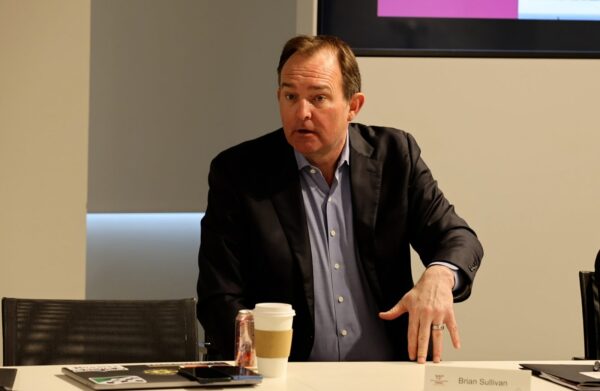So what do Hokies think of the current economy? The short answer: It depends on who you are and where you live.
At least that was the consensus that emerged during a 45-minute discussion about the state of the U.S. economy during the Finance Advisory Board’s meeting in New York City, which coincided with Pamplin College of Business’s 22nd annual Hokies on Wall Street gathering. The meeting was organized by Vijay Singal, department head of the finance, and Mike Clarke, chair of the Finance Advisory Board.
The Oprah-styled talk among a group of Pamplin students, alumni, faculty, and administrators was led by Brian Sullivan, a veteran CNBC anchor, host of “Last Call,” and a 1990 graduate of Virginia Tech, who deftly worked the room of fellow Hokies.
“Let’s be honest, if we are in this room, the economy is good to great,” said Sullivan.
But Sullivan pointed out that at a time of rising prices for housing and other assets, the economic picture is quite different for renters than for owners.
“If you’re an owner of stocks, bonds, and a home, the economy is fantastic, everything is up,” he said. “But if you’re an asset renter or an asset borrower, which is most of the country, I don’t think the economy is so good.”
It doesn’t help matters, Sullivan said, that inflationary forces still exist in the economy. “The Baltimore bridge collapse is going to spike car prices because Baltimore is the No. 1 port for car imports,” he said. “And housing and food prices aren’t coming down much.”
David Greenberg, chief investment officer of the Virginia Tech Foundation, which manages the university’s endowment, said this “two economies” theme is also defined by whether you’re living in a fast – or slow-growth area of the country.
“The economy is a tale of different areas of the country,” he said.
The flipside, however, to much of the growth in places such as Austin, Denver, Salt Lake City, or Northern Virginia is that the demand for housing is outpacing supply, which is only contributing to even higher home prices in places where the job growth is the greatest.
“I have been living in Salt Lake City for three years after spending 17 years in Denver,” said Trish Cox, a longtime financial services and health care industry executive who graduated from Virginia Tech in 1990. “I don’t think any city’s housing infrastructure has kept up with the growth.”
Much of the discussion focused on the difficulty recent Virginia Tech graduates are facing when it comes to affordable housing. Lacking the income to buy homes or to afford rent, many are choosing to live at home with their parents for years longer than previous generations of young people did in the U.S.
Rajesh Bagchi, department head of marketing, provided some global perspective on the topic.
“The rest of the world has been facing this forever,” he said. “In India, it’s not a new phenomenon because affording rent or buying a home is out of the question for most people, who end up living with their parents or living in the same house where they grew up. The same is also true in Europe and China. In fact, this phenomenon of young adults affording homes was fairly unique to the U.S. until prices began to rise.”
While most Hokies saw much to feel positive about regarding the U.S. economy, there was at least one dissenter to this view. “I think there is too much optimism founded on nothing,” said Suzanne Cutler, a managing director and head of capital markets at Webster Equity Partners and a Virginia Tech grad.
“Rates are still really high and asset prices are still dislocated.”
